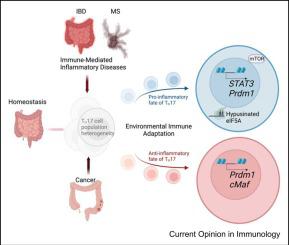Current Opinion in Immunology ( IF 6.6 ) Pub Date : 2023-05-10 , DOI: 10.1016/j.coi.2023.102333 Theodora Agalioti 1 , Filippo Cortesi 1 , Nicola Gagliani 2

|
At mucosal barriers, the T helper 17 (TH17) cell population plays a fundamental role in controlling tissue homeostasis. The adaptability of this population to a more pro-inflammatory or anti-inflammatory function — that is, their functional plasticity and consequently heterogeneity — primarily depends on the environment. We would like to term this process environmental immune adaptation. Interfering with TH17 cell adaptation leads to pathological consequences, including development of immune-mediated inflammatory diseases or even cancer. Several molecular mechanisms have been shown to participate in this process and recently, a better understanding of the transcriptional and metabolic profiling of TH17 cells has shed light on a new level of complexity. Here, we offer a summary on the role of TH17 cell plasticity in inflammatory diseases and cancer as well as the latest discoveries and controversies regarding the mechanisms that control the adaptability of the TH17 cell population.
中文翻译:

TH17细胞免疫适应
在粘膜屏障处,辅助 T 17 (TH 17 ) 细胞群在控制组织稳态中发挥着重要作用。该群体对促炎或抗炎功能的适应性(即功能可塑性和由此产生的异质性)主要取决于环境。我们想将此过程称为环境免疫适应。干扰 T H 17 细胞适应会导致病理后果,包括免疫介导的炎症性疾病甚至癌症的发展。多种分子机制已被证明参与这一过程,最近,对 T H 17 细胞转录和代谢谱的更好理解使复杂性达到了新的水平。在此,我们总结了 T H 17 细胞可塑性在炎症性疾病和癌症中的作用,以及有关控制 T H 17 细胞群适应性机制的最新发现和争议。











































 京公网安备 11010802027423号
京公网安备 11010802027423号